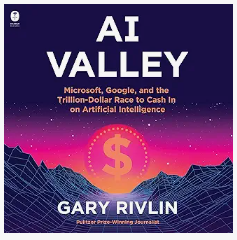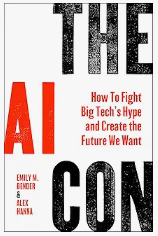


Psychology/AI-Finance
Exploring AI's influence on financial behavior and economic decisions.










Generative AI, Media, and Society 1st Edition.




AI Valley: Microsoft, Google, and the Trillion-Dollar Race to Cash In on Artificial Intelligence Audible Audiobook – Unabridged
Life 3.0: Being Human in the Age of Artificial Intelligence


Hello World: Being Human in the Age of Algorithms Audible Audiobook – Unabridged


The AI Con: How to Fight Big Tech's Hype and Create the Future We Want Hardcover – May 13, 2025




Nexus: A Brief History of Information Networks from the Stone Age to AI Audible Audiobook – Unabridged
How AI Influences Financial Decisions and Habits
Artificial intelligence is transforming the way people make financial decisions, often in ways that are subtle but powerful. AI-powered tools use data, algorithms, and predictive analytics to help individuals and businesses manage money, invest, and plan for the future.
AI affects financial behavior in several key ways:
#01) Personalized recommendations: AI analyzes your spending, saving, and investing patterns to suggest customized actions—like when to save more, invest, or cut back on expenses.
#02) Automated investing: Robo-advisors use AI to build and manage investment portfolios based on your goals and risk tolerance, reducing emotional bias and helping you stay disciplined.
#03) Real-time alerts and nudges: AI-driven apps send notifications about unusual spending, bill reminders, or opportunities to save, helping you avoid mistakes and stay on track.
#04) Fraud detection and security: AI monitors accounts for suspicious activity, protecting you from scams and unauthorized transactions.
#05) Behavioral insights: AI can identify patterns in your financial habits—such as overspending or under-saving—and offer strategies to improve them.
#06) Market analysis: AI processes massive amounts of financial data to spot trends and predict market movements, giving both individual investors and professionals an edge.
#07) Reducing emotional decision-making: By automating routine tasks and providing objective advice, AI helps minimize the impact of fear, greed, or overconfidence on financial choices.
#08) Accessibility: AI-powered chatbots and virtual assistants make financial advice and support available 24/7, lowering barriers for people who might not seek help otherwise.
To use AI effectively in your financial life:
#09) Stay informed about how your data is used and protected.
#10) Combine AI insights with your own goals and values—don’t rely on automation alone.
#11) Regularly review AI-generated recommendations to ensure they match your needs.
#12) Use AI as a tool to support, not replace, your judgment and financial education.
Understanding how AI shapes financial decisions empowers you to use technology wisely, avoid common pitfalls, and make choices that support your long-term financial well-being.
Understanding Money and AI
Exploring the intersection of AI, human psychology, and financial decisions to understand their impact on the economy and daily life.


How AI Shapes Financial Choices and Daily Money Habits
Artificial intelligence is rapidly changing the way we manage money, make investments, and plan for the future. By using massive data sets and advanced algorithms, AI tools are influencing financial habits in new and powerful ways.
#01) Smart budgeting: AI-powered apps analyze your spending and income, then automatically suggest budgets and savings goals tailored to your lifestyle.
#02) Personalized investment strategies: Robo-advisors use AI to build and adjust portfolios, helping you avoid emotional decisions and stick to long-term plans.
#03) Spending insights: AI tracks your daily purchases, highlights trends, and warns you about overspending or unusual activity.
#04) Instant financial advice: Chatbots and virtual assistants provide 24/7 answers to financial questions, making expert guidance accessible to everyone.
#05) Predictive alerts: AI forecasts upcoming bills, potential cash flow issues, or investment opportunities, so you can act before problems arise.
#06) Bias reduction: Automated systems help remove common human errors and emotional reactions, encouraging more rational financial choices.
#07) Fraud prevention: AI systems constantly monitor for suspicious transactions, keeping your accounts safer.
#08) Learning your habits: Over time, AI gets better at understanding your unique financial behaviors, offering smarter recommendations as you use it.
To get the most from AI in your financial life:
#09) Stay aware of how your data is used and protected.
#10) Use AI tools as a support system, not a replacement for personal judgment.
#11) Regularly review and adjust your financial settings and goals.
#12) Balance AI recommendations with your own values and priorities.
By leveraging AI thoughtfully, you can make smarter, more confident financial decisions—while keeping your habits aligned with your real-life goals and needs.
The Psychology of Money
Exploring AI's influence on financial behavior and the psychology behind our money decisions in modern economies.
"At Truality, we are dedicated to integrity, transparency, and delivering accurate, trustworthy content to empower our users."
© 2025. All rights reserved.
"Dedicated to Helping You Build Your Financial Future". Please, feel free to subscribe to our newsletters, updates, and special offers!
2025> please be informed site was AI assisted ⚠️ Content Integrity Protected
🔒 User-Secured Validation
🔒 AI-Assisted Content Notice > Portions of this website's content have been generated or enhanced using artificial intelligence tools. While efforts are made to ensure accuracy and reliability, AI-generated content may contain errors or inaccuracies. Users are encouraged to verify information and consult professionals for advice. [TRUALITY] is committed to transparency and content integrity. Please report to us any concerns.
"Affiliate Product Page"
